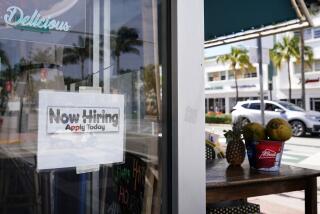Shrinking Brazil GDP May Signal Deepening Woes
- Share via
RIO DE JANEIRO — Brazil’s economy shrank in the third quarter, reports said Wednesday, marking what is widely seen as the beginning of a severe recession for Latin America’s largest economy.
Hurt by sky-high interest rates and weak demand, gross domestic product fell 1.5% in the quarter, the biggest drop since the 1995 Mexican currency crisis, the National Statistics Institute said. GDP is the broadest measure of a nation’s economy.
The institute said unemployment jumped to a record 7.8% in the quarter, further proof of economic weakness.
President Fernando Henrique Cardoso tried to put a dash of color on the gloomy economic picture, insisting Brazil is on the mend. “We are overcoming our temporary problems,” he said.
But analysts said the economy has only just begun to absorb the impact of the global turmoil and a steep increase in interest rates in September, part of an austerity plan meant to put the country on a sounder footing.
Some analysts have said Brazil will fall into recession after the problems afflicting emerging markets spread from Asia to Russia, which devalued its currency and stopped repaying debts in August.
Since then, Brazil’s government has been scrambling to avert a similar fate. It jacked up interest rates to 40% to choke off massive dollar outflows and put together a drastic fiscal savings plan to bring down the budget deficit.
The Congress took action on that front Wednesday, passing two bills aimed at raising an extra $3.95 billion in taxes next year by increasing to 3% from 2% a tax on companies’ revenue, including banks and fuel retailers. It also passed a bill that will allow the government to tax state retirees’ earnings.
But government economists said the decline in GDP in the third quarter was only a hint of what is to come. The recent global turmoil “should have had fully observable repercussions only on the indicators of the fourth quarter of 1998,” the statistics institute said in a statement.
Signs of the cooling economy were most evident in the manufacturing sector, where a sharp drop in sales of big-ticket items like cars was already forcing factories to cut workers.
More to Read
Sign up for Essential California
The most important California stories and recommendations in your inbox every morning.
You may occasionally receive promotional content from the Los Angeles Times.













